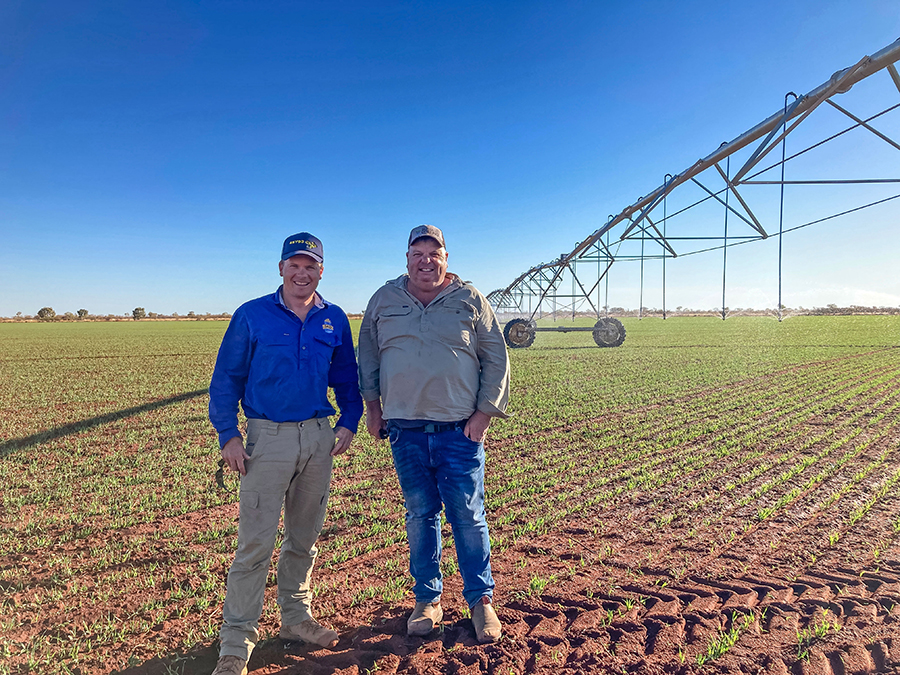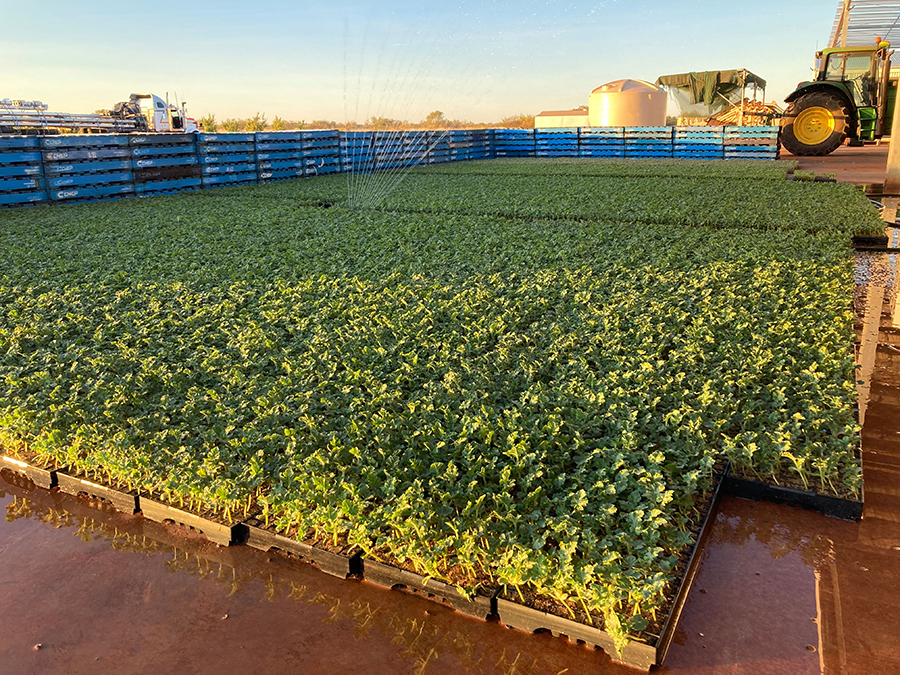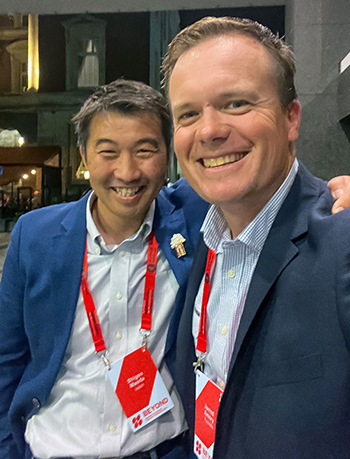Snapshot
Growers: Jarrod and Emma Amery
Location: Forbes, NSW
Farm size: 1600 hectares owned; 800ha leased
Area cropped: 1750ha
Area pastured: 650ha
Average annual rainfall: 525 millimetres
Actual in-crop rainfall (2023): 183mm
Soil types: red loam and grey self-mulching
Soil pHCa: 5.4 to 5.7
Topography: undulating to flat
Enterprises: cropping and 3500 Merino ewes
Crops grown: Naparoo , Sunflex and Beckom wheat; Pioneer® 44Y94 CL; Planet barley
Typical crop sequence: wheat/canola/barley
When Jarrod Amery’s business coach suggested he apply for a Nuffield Scholarship, he decided it was worth pursuing to learn more about what it takes to build and maintain a successful farm business.
The 41-year-old – who farms 2400 hectares with his wife Emma near Forbes, New South Wales – felt he had much to learn.
Specifically, he wanted to understand global agriculture better and see how the ‘best of the best’ farmers ran their businesses.
After applying, he was delighted to learn that GRDC would invest in his 2020 Nuffield Scholarship.
Jarrod says one of the best parts of the program was leaving the farm for six weeks and relying on others to run the business.
“It takes effective planning and a great team,” he says. “It improved my trust in my team and my team’s belief in themselves.”
In 2020, the COVID-19 pandemic prevented Jarrod from travelling overseas. So, he travelled 14,500 kilometres around Australia. He also visited Singapore, Japan, Denmark, Israel, New Zealand and the US when travel restrictions were lifted.
Action takers

Jarrod Amery met Paul McLaughlin, who grows wheat and watermelons north of Alice Springs in the Northern Territory. Photo: Emma Avery
While travelling in Australia, Jarrod met Northern Territory watermelon grower Paul McLaughlin, who produces about 20,400 tonnes of fruit annually.
“Before moving to Alice Springs, Paul grew just one crop of watermelons annually near Condobolin, NSW,” he says.
“But by carving a farm out of the desert and sinking some bores for irrigation water, he lifted his production from 50t/ha to 85t/ha.”
And because the climate is better near Alice Springs, he says, Paul now grows two crops yearly instead of just one.
Jarrod says his lesson from Paul was that successful farmers can almost “smell” an opportunity.
“It’s the really successful people in agriculture that take action,” he says. “Information without application leads to fascination, but information with application leads to transformation.”

Watermelon seedlings at Paul McLaughlin’s farm north of Alice Springs, NT. Photo: Jarrod Amery
Corn in Japan
In Japan, Jarrod met Shigeo Maeda, a wheat and popcorn grower, on a 120ha property on the island of Hokkaido.
On Shigeo’s farm, he says, corn for popping is grown across 10ha, and wheat and other grains are grown across 110ha.
“The wheat is milled into flour and sold to bakeries,” he says. “Japan is not warm, so growing popcorn isn’t easy.”
But successful people often view a problem as an opportunity, he says. Shigeo’s problem was that he had to lay off his staff from December to March because the temperature hit minus 25°C, and nobody could go into the paddock. Shigeo decided to grow popcorn and make a factory in his shed to keep his workers employed.
“Shigeo is trying to fix a problem, and this is what successful people do well,” Jarrod says. “If you are fearful of making a mistake, you will never learn the skills required to enable you to know your limitations.”
Accordingly, he learned successful people become comfortable with being uncomfortable.
“Successful people also think beyond others’ limits,” he says. “And successful people see failure as success in motion.”
Curiosity and humility
 Japanese grain grower Shigeo Maeda with Jarrod Amery, Forbes, New South Wales. Photo: Jarrod Amery
Japanese grain grower Shigeo Maeda with Jarrod Amery, Forbes, New South Wales. Photo: Jarrod Amery
Two other traits of successful farmers are curiosity and humility.
“To be curious enough to ask a question, you need to be humble enough to ask the questions. Because if you’re not humble, you will be too proud to ask the questions needed to succeed,” Jarrod says.
From 2013 to 2014, he says, Shigeo was determined to grow corn for popping. So, he planted some seeds. But according to Shigeo, it was the poorest popcorn in the world. This is because there is not enough heat to grow the popcorn in Japan.
As Shigeo’s corn grows into the frosty time of year, his corn kernels achieve a poor pop ratio.
“So, with Shigeo’s amazing curiosity, he found a grower in Ireland doing something similar and decided to have a look,” Jarrod says. “Successful people have amazing listening skills and ask many questions.”
When Shigeo went to Ireland, he learned that plastic is the key to growing corn in cold climates.
“He puts in the corn, puts the plastic down, and the soil temperature rises above 5oC. Bingo, he has shortened the growing season of the popcorn.”
Business associates
Successful farmers also associate with people they want to emulate.
“You’ll never fly like an eagle when you hang around with turkeys,” Jarrod says. “Shigeo has mentors, coaches and peers from whom he gathers wisdom and knowledge.”
Jarrod regularly asks his team members for their thoughts about the farm.
“I like to have a collective brainstorm, so everybody is included. Because some of the best decisions are made by the group. If you’re not listening to your team, you may wonder why they leave.”
For example, he bought a block of land at Wirrinya in the past and says he did not do very well. And part of the reason was that he was not listening to his team.
“Good listeners ask questions,” he says. “And if you ask good questions, you’ll get good answers. It’s difficult to ask good questions if you don’t ask with a spirit of humility.”
It was not until he was nearly broke at Wirrinya that he reached out for help.
Now, Jarrod values the high-quality advice provided by farm management consultant Eric Nankivell from Farmanco, agronomists James Ingrey and Henry Mitton from Delta Agribusiness and grains analyst and marketing adviser Joe Righetti from Wattletree Consulting.
“People are happy to help you if you come to them listening, with a spirit of humility and curiosity,” he says.
His Nuffield Scholarship also allowed him to associate with humble people who are on a journey of learning and are happy to help others.
Timing and details
Two further traits associated with successful farmers, he says, are timing and attention to detail.
“Shigeo’s timing of popcorn sowing is important because he has to have the corn in the ground, the plastic on, and the crop harvested by the first frost. If he can do that, his pop percentage is insanely good.”
To buy a packaging plant and wrappers for his microwaving popcorn, Shigeo travelled to the US. But the seller said he needed to buy one million bags as a minimum order.
At that time, Shigeo thought, ‘Am I stupid or just crazy?’ But, Jarrod says, Shigeo has sold more than three million bags of popcorn since 2015 because he is the only popcorn grower in Japan.
Similarly, the growers Jarrod visited in New Zealand were details-oriented in managing their livestock and grazing systems.
“They were exceptional at managing pastures using rotational grazing. Their ability to run livestock at high stocking rates and generate a profit was brilliant.”
In his own business, Jarrod prioritises sowing on time to ensure crops flower at the right time for his environment.
“The air seeder has to be sitting at the gate on 7 April ready for canola planting,” he says. “We aim to have our seed graded and machinery maintained one month before sowing.”
He also applies fungicides at growth stages 31 and 39 to ensure wheat is well-protected against disease.
Regarding urea, Jarrod says he had most of it on his 2023 crops by early tillering.
“We really did need more nitrogen but couldn’t procure the total tonnage required. We spread what we did have strategically to give us the best possible outcome.”
Work-life balance
When Jarrod visited Shigeo in Japan, the wheat and popcorn grower had just returned from the US with his son.
“Although the aim was to see how popcorn was grown on other farms, Shigeo was having some father-and-son time. I want to encourage people to do that with their kids, too. Let’s take our families on the journey. It’s really important.”
While travelling in the Northern Territory, Jarrod met Emma and Adrian Brown from Amungee Mungee station.
“Emma said to me: ‘Jarrod if you play with your kids when they are young, they’ll stay with you when you’re old’. She also said to employ somebody smarter than yourself or your business will only be what you can make it.”
Hire quality staff
From Delta Agribusiness director Gerard Hines, Jarrod learned that good people attract good people.
“Gerard told me that if you don’t set the culture of your business, the culture of your business will just happen by default, and it may not be good,” he says. “It’s better to have no one than an average one. So, hire good people on your team.”
Jarrod is committed to hiring high-quality staff. He employs livestock manager Paul Willersdorf and cropping operator Andrew Pyne and is looking for another team member.
Work-life balance is important for the Amery family. When they bought their last block of land, they subdivided the house and sold the land to help pay down the debt on the cropping country. This meant they did not have to deal with rental agents or tenants.
Jarrod aims to have six weeks off each year and Sunday each week, except at sowing and harvest.
Purpose and vision
Another finding was successful farmers have a clear purpose and vision.
“In World War II, the US bombed Shigeo’s grandparents’ potato starch factory and, if that wasn’t bad enough, the Japanese government took their 1600ha farm without payment and gave them 6ha,” he says.
“I spoke about this with Shigeo, and he said his purpose was to restore his farm to its former glory, and he is doing that.”
In the past five years, Jarrod has focused on investing in variable-rate lime to increase his soil pHCa to 5.7.
“Land values have greatly increased in our district,” he says. “There is a good return on investment for ensuring that our soil is working at full capacity before we buy the next block of land.”
Study findings
When it comes to making suggestions to others keen to build their businesses for success, Jarrod says to consider all the pillars of success, not only those you are naturally good at.
“I’ve learned that businesses will only ever be as strong as their weakest link,” he says. “Be open to some things in your business that need to change.”
For himself, he wants to work on knowing and improving his financials.
“Our business is going great, but it can be better,” he says. “According to ABARES, the averaged mixed farmer in Australia has a return on assets managed of 1.7 per cent.”
However, Farmanco’s Eric Nankivell told Jarrod the average of his client base had a return on assets managed of 3.79 per cent.
Eric’s top 25 per cent of clients achieved a return on assets managed of 9.36 per cent. The keys to their success were timeliness and high-quality farm staff.
Another lesson Jarrod learned is that “you’ll always have more regrets about the things you’ve never had a go at than the things you did”.
He says success is enjoying the journey, not just the destination.
“We are goal-driven, and when we reach a goal as a family, we celebrate by having a picnic when the canola is in full flower, for example. Or taking our staff to the pub for a meal.”
He encourages growers to consider applying for a Nuffield Scholarship.
“If you’re prepared to be challenged and taken out of your comfort zone, have a go,” he says.
“I’m inspired by people who do things with excellence and are willing to try, even if they fail the first time. Because failure really is just success in motion.”
GRDC is a long-term supporter of the Nuffield Scholarship program and encourages those who desire to enhance their knowledge to apply for a 2024 Nuffield Scholarship supported by GRDC. Visit the Nuffield Australia website.
More information: Jarrod Amery, jeamery1@bigpond.com

























































